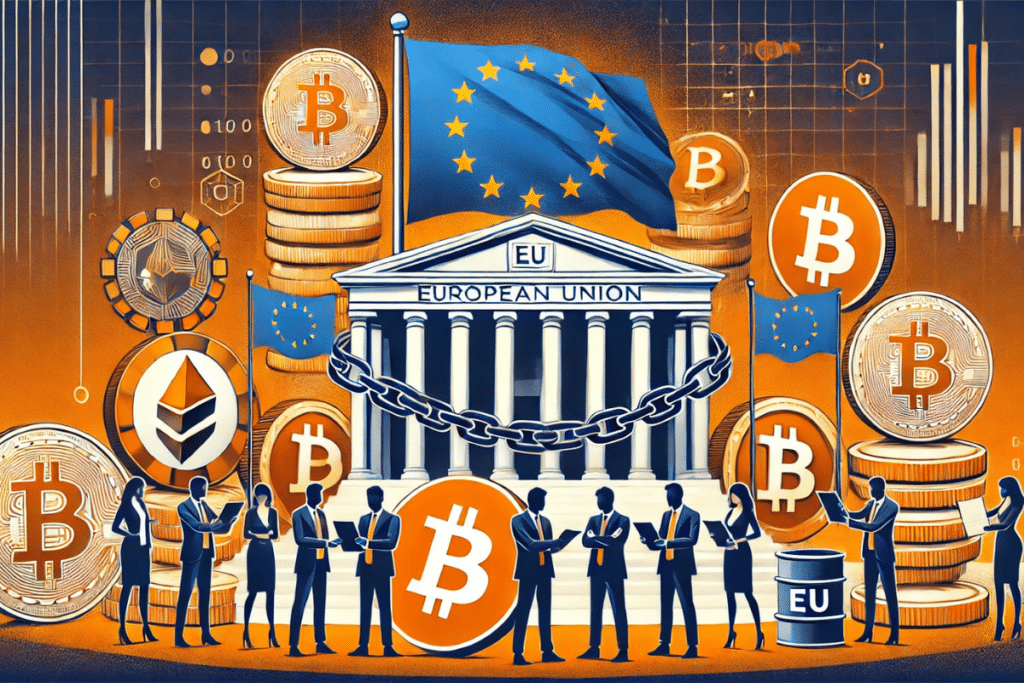The End Of Crypto Freedom? The EU Tightens The Screws With Strict Measures.
The European Union has just thrown a stone in the pond by publishing new guidelines that could well change the game for crypto service providers. Bitcoin enthusiasts and other crypto-assets are wondering: are we witnessing the end of freedom in the decentralized world of cryptos?

The EU reveals its cards: unprecedented restrictive measures
The European Banking Authority (EBA), the EU’s regulatory body, recently published two series of guidelines specifically targeting payment service providers (PSPs) and crypto-asset service providers (CASPs). These guidelines require industry players to establish robust control systems to comply with the EU’s restrictive measures.
Specifically, this means that every transfer of funds or cryptocurrencies must be meticulously monitored. PSPs and CASPs will need to filter information to prevent individuals or entities from circumventing the established rules. The stated objective is to strengthen financial security and combat money laundering and the financing of terrorism.
This initiative from the EBA is part of a desire to fill the gaps in the financial sector. But for many, it looks like an intent to control a universe that has always championed decentralization and freedom. Crypto providers thus face a significant challenge: how to comply with these new obligations without betraying the very spirit of cryptocurrencies?
Bitcoin and cryptos: towards mandatory compliance or suffocation?
Bitcoin enthusiasts know it well: the very essence of this digital currency lies in its decentralized nature and resistance to censorship. With these new measures, the EU seems determined to strictly regulate a domain that still partially eludes it. Some see a direct threat to the financial freedom promised by cryptos.
However, it is important to add nuance. These guidelines primarily aim to prevent illegal activities. After all, no one wants cryptocurrencies to become the playground of criminals. The question, therefore, is to find the right balance between security and freedom.
Crypto service providers have until December 30, 2025, to comply with these new rules. This allows time to adapt, but the countdown has begun. Industry players will need to double their efforts to integrate these obligations while preserving the accessibility and fluidity of the services they offer.
A delicate but necessary transition?
It is undeniable that these restrictive measures will disrupt the crypto landscape in Europe. But perhaps it is a necessary step to ensure the sustainability of Bitcoin and other cryptocurrencies. By complying with regulatory requirements, the sector could gain legitimacy and attract more institutional investors.
On the other hand, it is legitimate to fear a loss of freedom and excessive bureaucratization. Crypto providers will need to innovate to reconcile these new constraints with the original spirit of cryptocurrencies. This could involve the development of more efficient compliance technologies or increased collaboration with regulators.
In the end, the world of crypto has always been able to adapt and evolve in the face of challenges. This new stage could well be an opportunity to strengthen its resilience and once again prove its ability to innovate. After all, as the saying goes, “what does not kill us makes us stronger.”
Maximize your Cointribune experience with our "Read to Earn" program! For every article you read, earn points and access exclusive rewards. Sign up now and start earning benefits.

Fascinated by Bitcoin since 2017, Evariste has continuously researched the subject. While his initial interest was in trading, he now actively seeks to understand all advances centered on cryptocurrencies. As an editor, he strives to consistently deliver high-quality work that reflects the state of the sector as a whole.
The views, thoughts, and opinions expressed in this article belong solely to the author, and should not be taken as investment advice. Do your own research before taking any investment decisions.